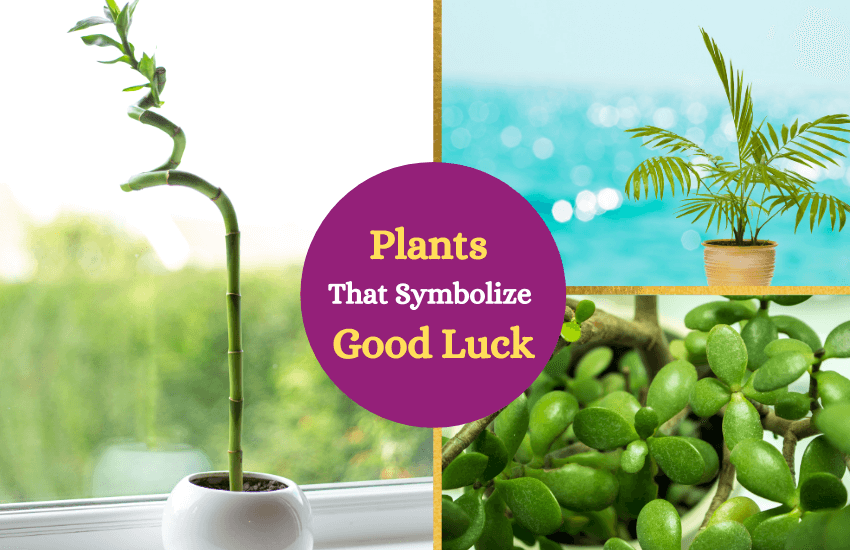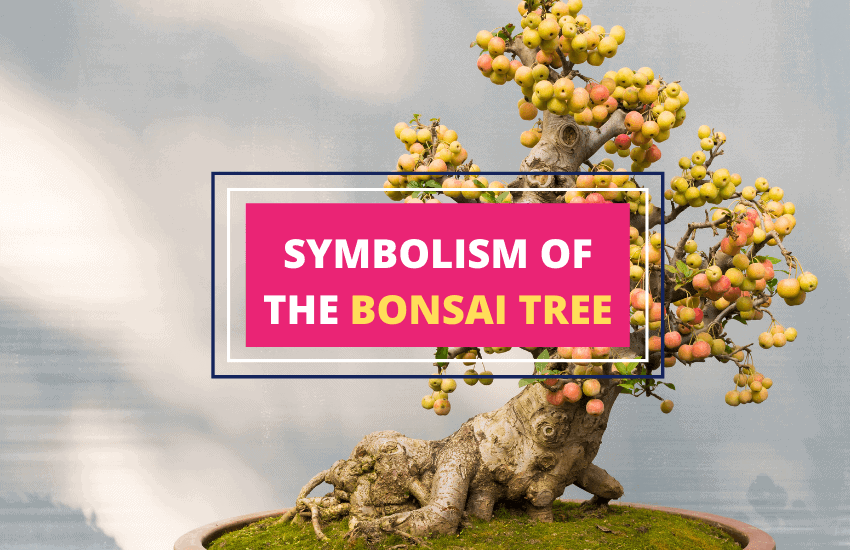
Table of Contents
A Bonsai is a miniature tree grown in a shallow dish or bowl and reflects both an individual’s gardening skills and artistic tastes. It symbolizes the balance, simplicity, and harmony of nature.
Bonsai trees are cultivated both for personal use and commercial purposes. The tree can be grown by apprentices and experts in a costly and inexpensive manner, and any type of tree can be grown in a pot and turned into a Bonsai. While they take a fair amount of work, Bonsai trees are stunningly beautiful and meaningful when done right. Here’s a look at the history of Bonsai trees and what they symbolize.
Origins of the Bonsai tree
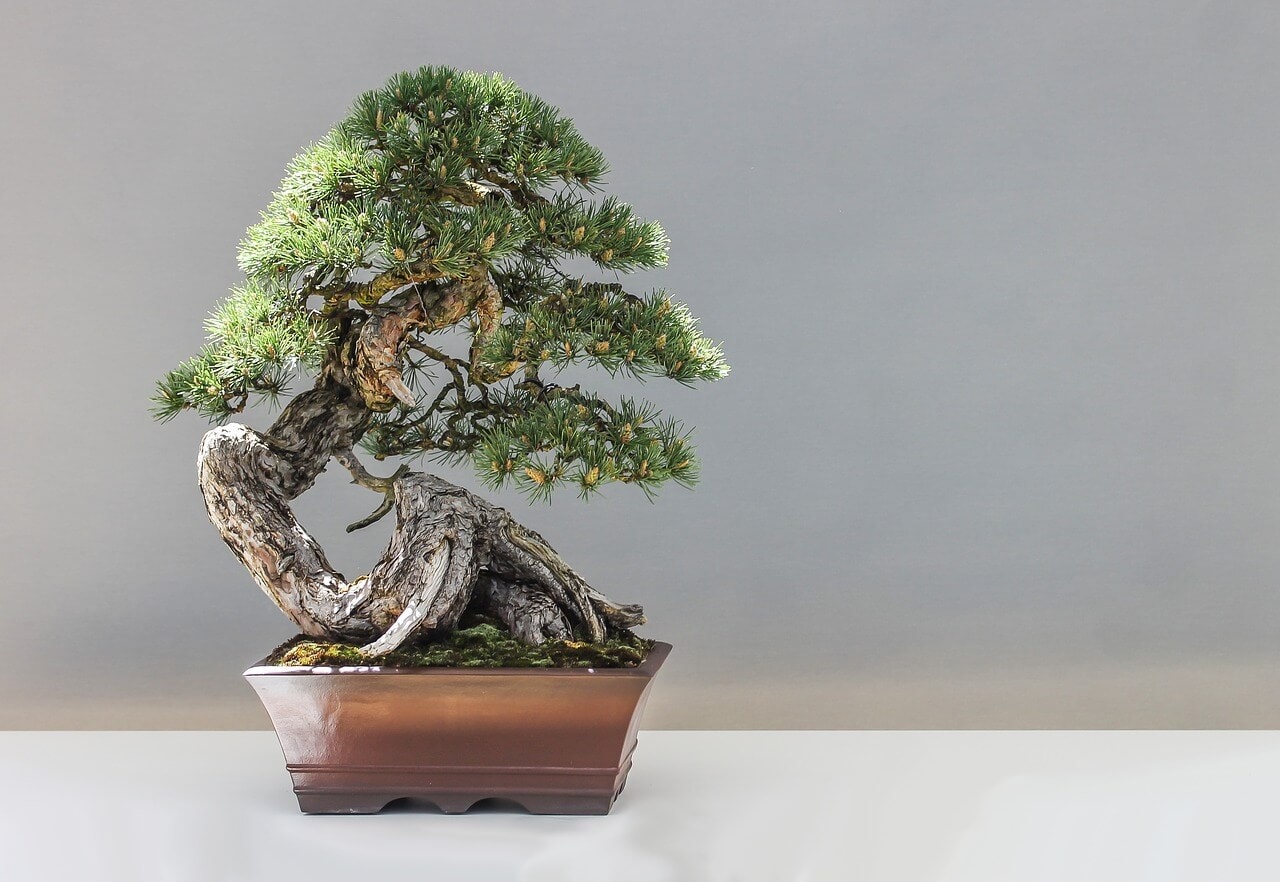
The earliest known record of Bonsai trees appears in ancient Chinese horticulture practices. Around 700 A.D., the Chinese began the art of pun-sai, or the cultivation of dwarf trees. In China, this art was an elite practice as very few individuals had the time and money to grow miniature trees.
The art of growing Bonsai was brought into Japan about 1200 years ago, where it flourished. The Japanese word Bon means a shallow container, and the word Sai means a tree planted in a vessel. The Japanese refined the techniques of the Chinese and experimented with a greater variety of Bonsai trees. The Bonsai was particularly honored and venerated in Japanese Zen Buddhism for its symbolism.
In western society, records and observations of the Bonsai tree begin as early as the 1600s, but the art gained prominence only from the 19th century onwards.
Symbolic Meanings of Bonsai Trees
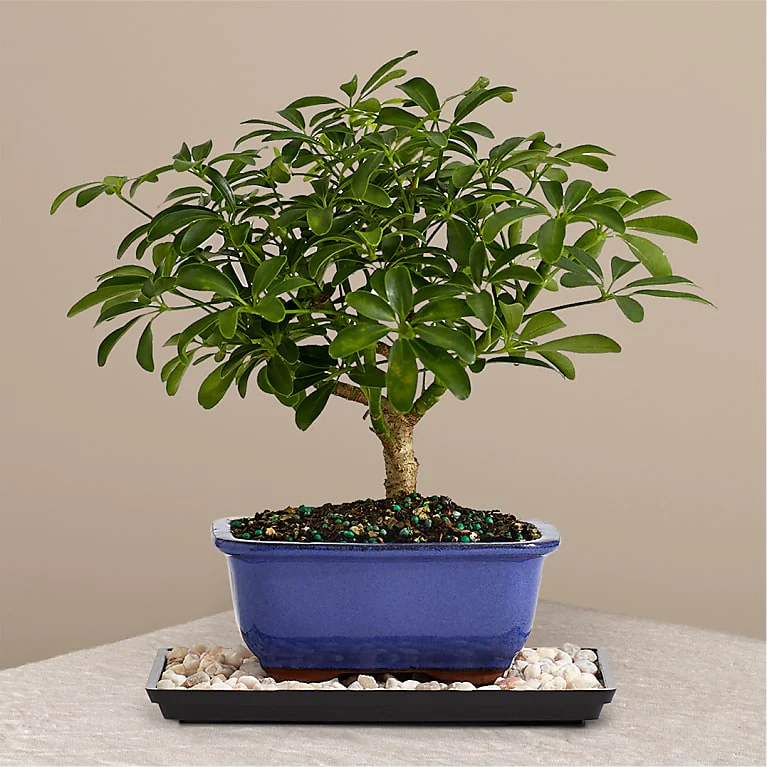
Bonsai trees reflect and symbolize various aspects of the natural world, such as balance, simplicity, harmony, and age. Each part of a Bonsai tree, including its roots, trunks, and branches, stands as an emblem of Japanese culture and society.
1- Balance
A Bonsai tree is designed and pruned in such a manner that it reflects balance and stability. It’s grown in the shape of an isosceles triangle, to reflect equilibrium and strength. An isosceles triangle is preferred over a regular triangle to create a more natural and imperfect symmetry. The Japanese prefer incongruous shapes, due to their dynamism, freedom, growth, movement, and continuity.
2- Harmony
The bark, twigs, and leaves of the Japanese Bonsai are designed to reflect harmony. A tree would have both sharp and smooth edges, old and young aspects. The gardener and artist would meticulously design the Bonsai to reflect the harmony of nature. The uniqueness lies in the fact that the Bonsai has several different elements put together yet manages to establish and maintain harmony. Harmony is an integral part of Japanese social, cultural, and religious life.
3- Age
A Bonsai tree is designed in such a manner that it symbolizes the various ages and stages of a human’s life. It can also reflect a Japanese family, where the old and young live together. Each aspect of the tree reflects and represents a particular time of life.
- Exposed roots: A Bonsai tree that has exposed roots symbolizes old age.
- Circular trunks: If the Bonsai has circular trunks, it means it’s a mature tree that has been victorious over the various elements of nature.
- A smooth trunk: A smooth and unblemished trunk represents the innocence of youth.
- Gnarled trunks and drooping branches: A Bonsai with gnarled trunks and drooping branches is a symbol of old age and wisdom.
- Dead trunk: A dead trunk that’s placed beside the tree symbolizes its rebirth and evolution.
4- Simplicity
The Bonsai tree is a symbol of simplicity. The tree is usually grown in an earthen pot without any complicated design or ornament. This is done to ensure that viewers give their full attention to the tree, rather than to the pot or the space in which it’s kept. The tree in itself is a beautiful sight with its green leaves and twisting branches.
5- Landscape
The Bonsai tree is designed in such a manner that it can reflect various seasons and landscapes. Each viewer can relate the Bonsai tree to their own subjective experiences with the natural environment. A Bonsai tree can also have a particular theme, and it can reflect a particular scenery or place.
Types of Bonsai Trees
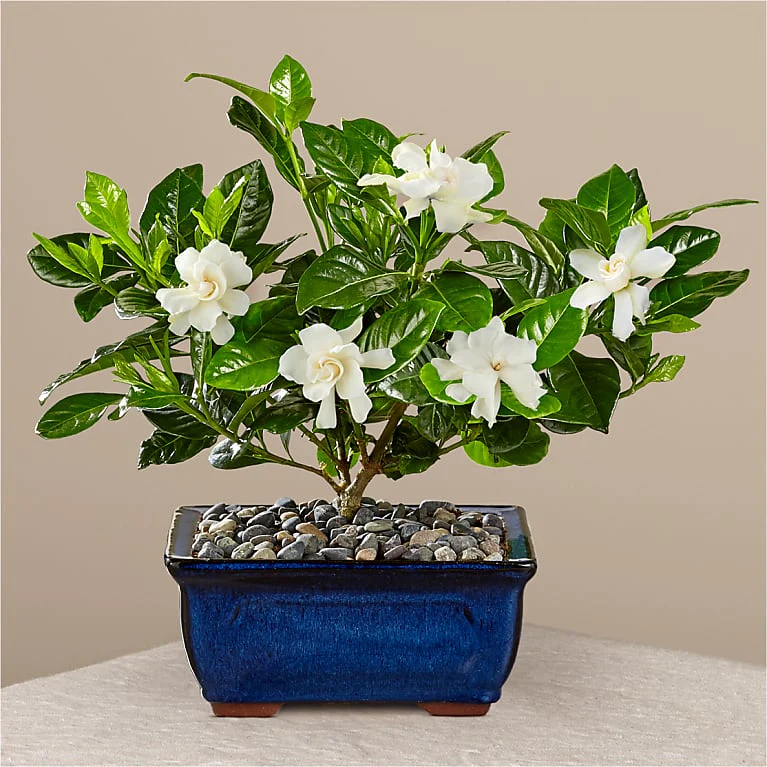
While a Bonsai tree is chosen depending on the taste and subjective experiences of an individual, there are many different types of Bonsai trees, and each one of them carries symbolic meanings.
Upright Bonsai Tree
An upright Bonsai tree has a straight trunk and symbolizes health, strength, and vigor. This type of tree has several healthy leaves and branches, due to its constant exposure to sunlight. An upright Bonsai tree has a thick trunk at the bottom and a thinner one at the top.
Informal Upright Bonsai
The informal upright Bonsai grows in the shape of an S. the trunk’s base should be thicker than the upper portion. The informal upright Bonsai represents stability, strength, and endurance.
Slanting Bonsai Tree
The slanting Bonsai tree’s growth depends on the direction of the wind. In this style, the roots are developed on one side, to keep the tree balanced and standing. The slanting Bonsai tree represents the strength to overcome troubles and hurdles.
Cascading Bonsai
The cascading Bonsai is grown in deep pots and resembles a tree swaying on a steep cliff. The cascading Bonsai is one of the most challenging trees to grow. It symbolizes the various changes and challenges in life.
Gifting Bonsai Trees
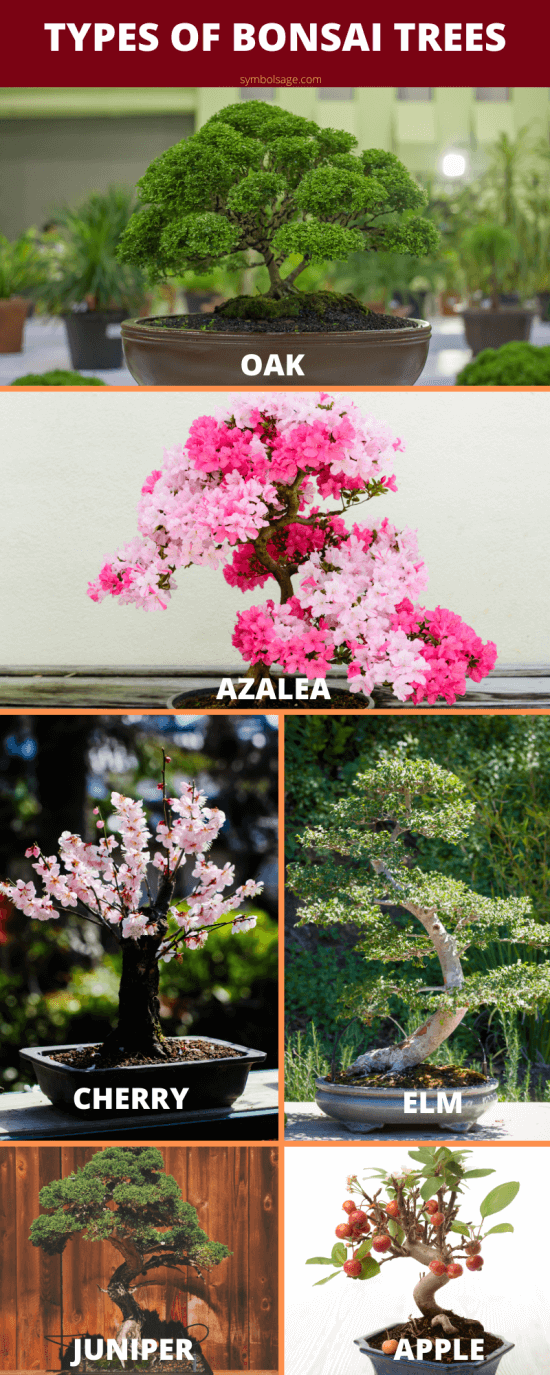
Bonsai trees are a popular choice for a gift. They are given for greater prosperity, wealth, good fortune, and luck. In general, a Bonsai tree is chosen based on its symbolic value and meaning. The list below contains the most popular choices of Bonsai trees.
1. Azalea Bonsai:
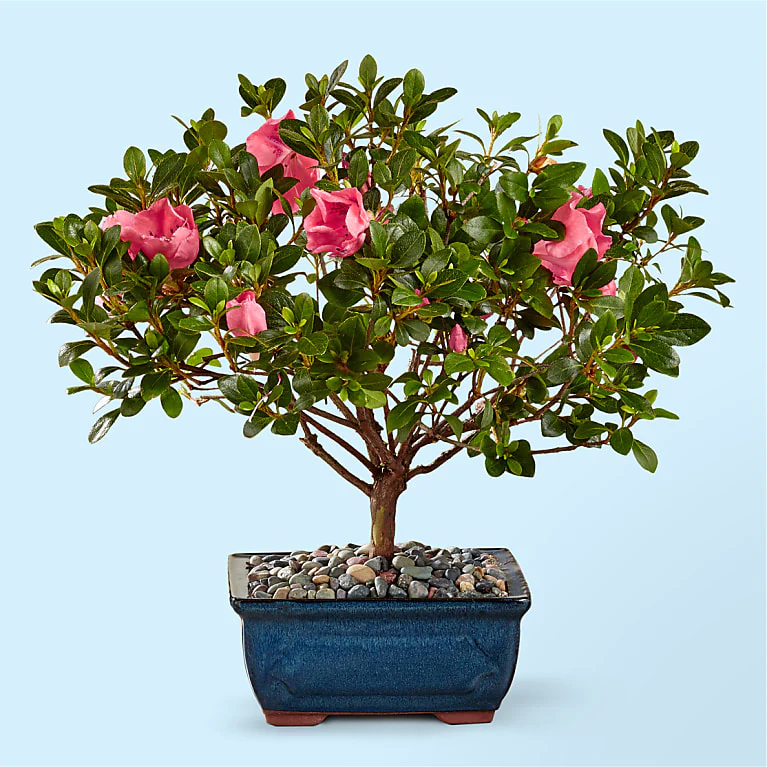
The Azalea Bonsai can be gifted to a spouse, betrothed, or lover. Its pink, white, and red flowers, symbolize love, passion, femininity, beauty, and gentleness.
2. Ficus Bonsai:
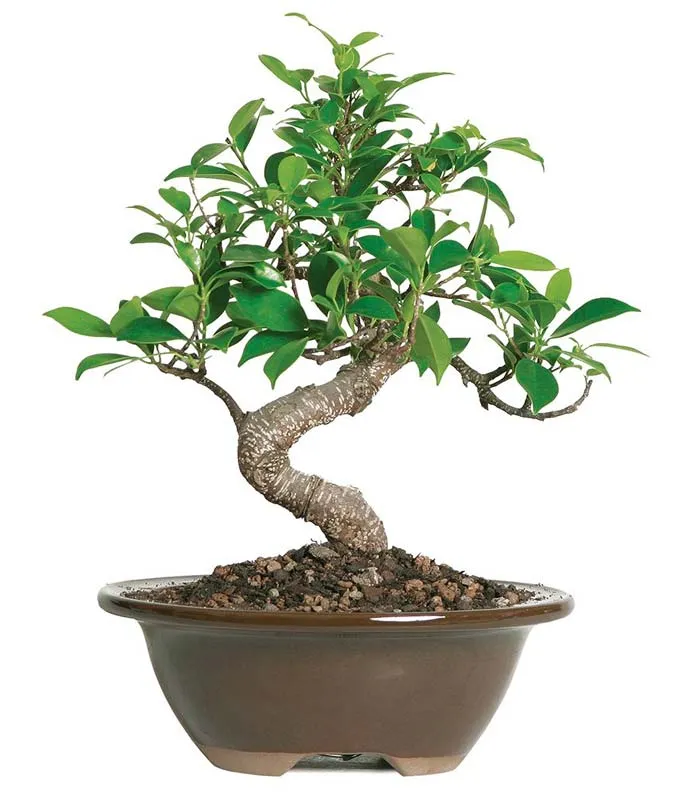
The Ficus Bonsai instills positive energy and is known to reduce sadness and depression. It symbolizes happiness, joy, unity, harmony, and new beginnings. It can be gifted to those who are suffering from mental illnesses or starting a new career.
3. Jade Bonsai:
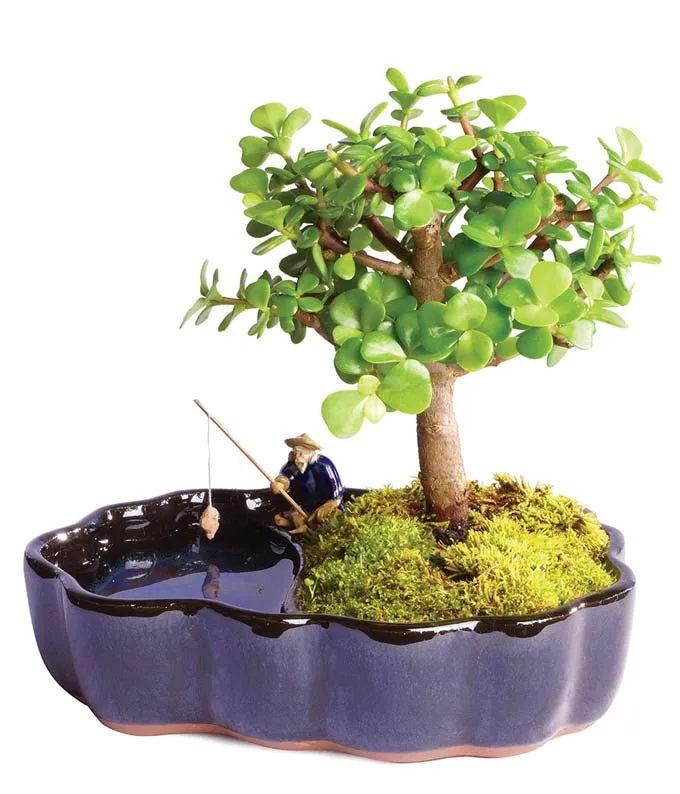
The Jade Bonsai brims with positive vibrations. It’s gifted for good luck and prosperity. The Jade Bonsai’s green leaves symbolize energy, growth, and renewal and are ideal for gifted to friends or family members.
4. Juniper Bonsai:
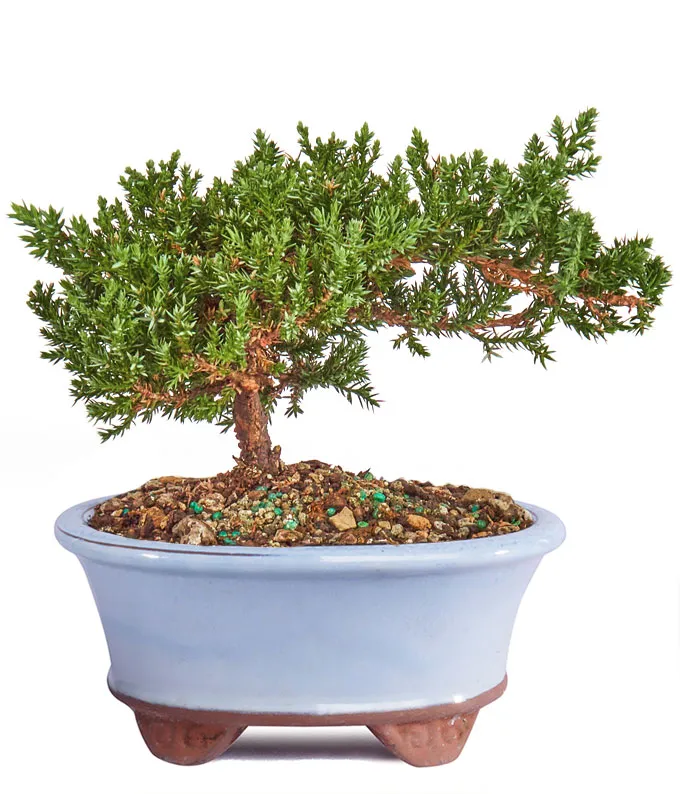
The Juniper Bonsai is viewed as a protective charm that guards the house against evil spirits. It symbolizes, purity, healing, and strength. This Bonsai can be gifted to spiritual friends and relatives.
5. Cherry Blossom Bonsai:
The beautiful Cherry Blossom Bonsai symbolizes several concepts. It can symbolize temporariness, or female dominance, strength, and beauty. The Cherry Blossom is also a symbol of renewal, rebirth, and new beginnings. Due to its versatile qualities, the Cherry Blossom can be gifted to friends, family, colleagues, or lovers.
6. The Elm Bonsai:
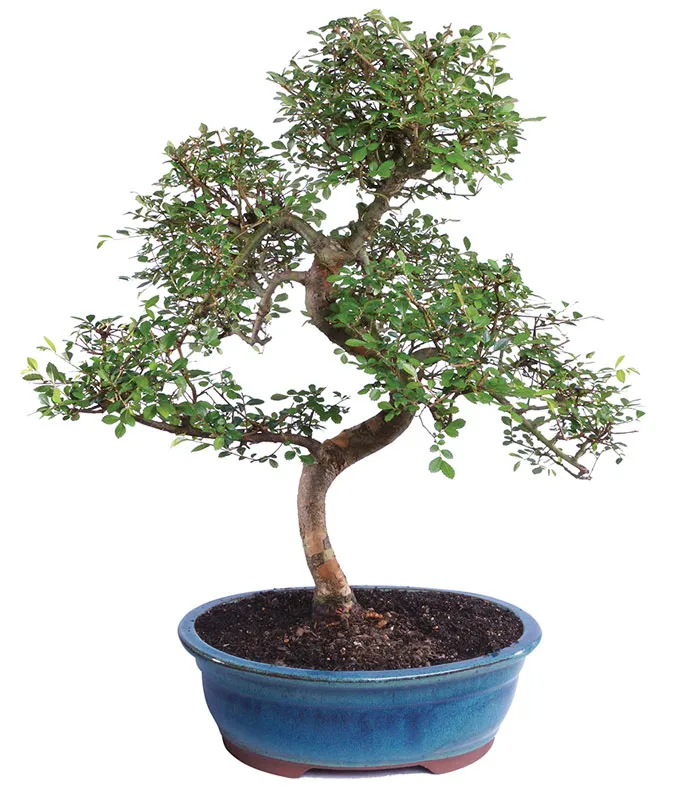
The Chinese Elm Bonsai is a good-omen, which symbolizes inner strength, intuition, wisdom, and love. It can be gifted to those who feel like they need more hope and support in life.
7. Cedar Bonsai:
Cedar Bonsais are associated with spirituality, prayer, and medicinal healing. It symbolizes immortality, strength, and protection. The Cedar Bonsai can be gifted to a spiritual family, friends or relatives.
8. Oak Bonsai:
The Oak Bonsai has strong trunks, and symbolizes longevity, knowledge and wisdom. The Oak Bonsai can be gifted to those seeking spiritual enlightenment.
Bonsai as a Symbol of Women’s Social Limitations
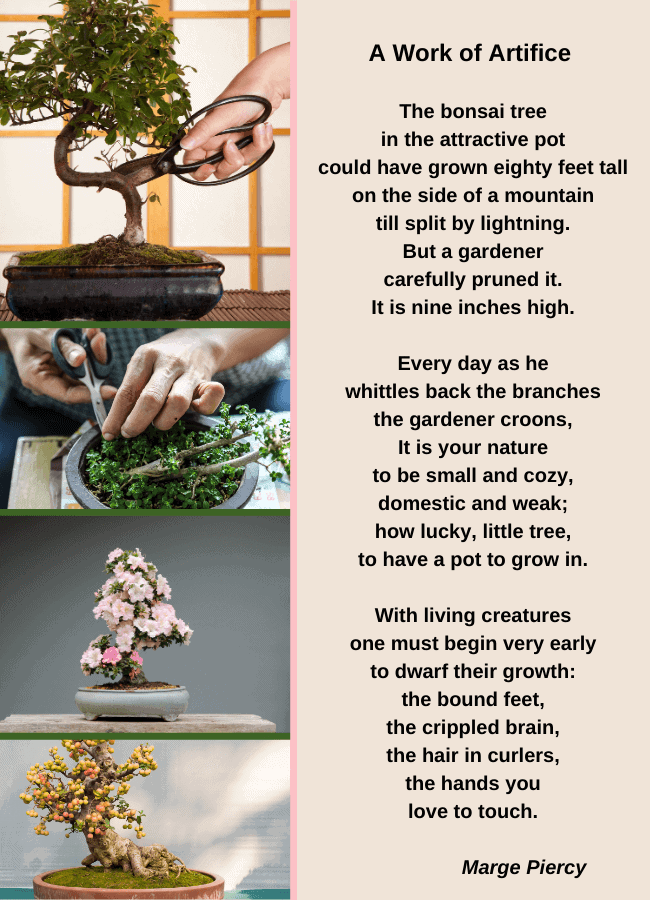
Because Bonsais are made by pruning, conditioning and forcing trees to grow according to the gardener’s desires, it is an excellent metaphor for social limitations and restrictions, especially of women.
A poem by Marge Piercy called A Work of Artifice describes how women are conditioned to live a restricted life, much like a Bonsai. The author uses the image of the Bonsai to convey her message.
The Benefits of Bonsai Trees
Bonsai trees not only look aesthetically pleasing, but they are also beneficial to physical and mental health. Having a Bonsai at home or in the workspace will create a calm and serene atmosphere. Due to this, the Bonsai is often used as a stress reliever. Many monks who practice Zen Buddhism tend to meditate near a Bonsai tree. Bonsais also produce clean air that can purify one’s surroundings. The act of pruning and taking care of a Bonsai is also seen as rather therapeutic.
In Brief
In recent times, the Bonsai has gained more popularity, and newer varieties of trees are being cultivated. The art of growing Bonsai is a dynamic one that’s constantly changing and developing.






